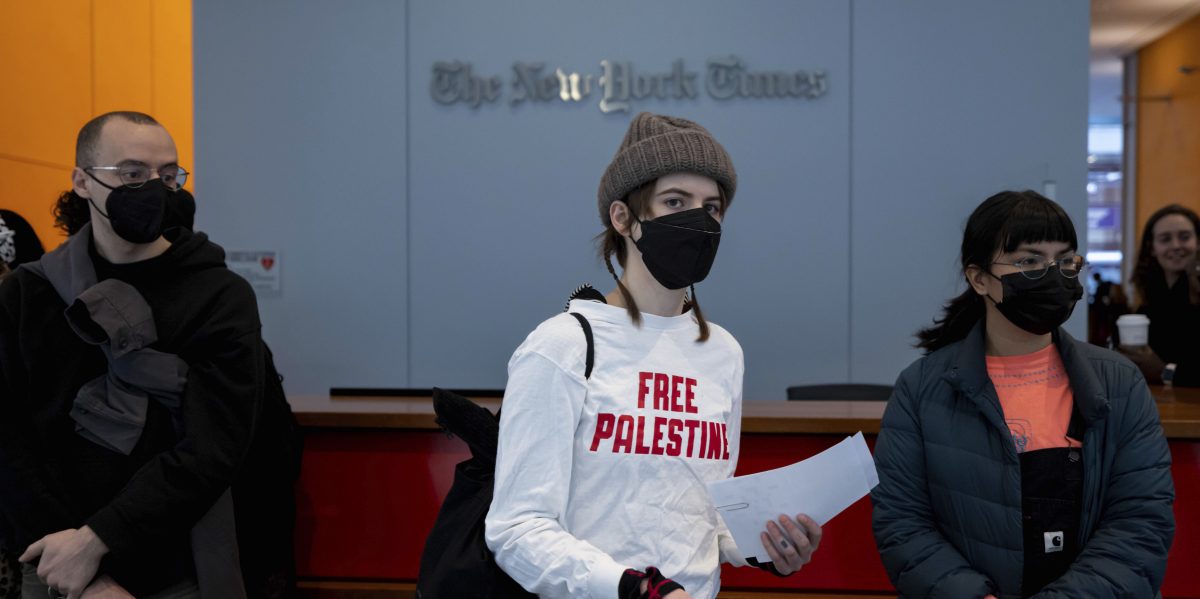The New York Times instructed journalists covering Israel’s war on the Gaza Strip to restrict the use of the terms “genocide” and “ethnic cleansing” and to “avoid” using the phrase “occupied territory” when describing Palestinian land, according to a copy of an internal memo obtained by The Intercept.
The memo also instructs reporters not to use the word Palestine “except in very rare cases” and to steer clear of the term “refugee camps” to describe areas of Gaza historically settled by internally displaced Palestinians, who fled from other parts of Palestine during previous Israeli–Arab wars. The areas are recognized by the United Nations as refugee camps and house hundreds of thousands of registered refugees.
While the document is presented as an outline for maintaining objective journalistic principles in reporting on the Gaza war, several Times staffers told The Intercept that some of its contents show evidence of the paper’s deference to Israeli narratives.
Almost immediately after the October 7 attacks and the launch of Israel’s scorched-earth war against Gaza, tensions began to boil within the newsroom over the Times coverage. Some staffers said they believed the paper was going out of its way to defer to Israel’s narrative on the events and was not applying even standards in its coverage. Arguments began fomenting on internal Slack and other chat groups.


Much of that had already happened by then, one of the reasons for 1996 election dynamics. And I don’t think there was possibility to make many of Soviet industries profitable or even functional. It was a complete collapse due to administrative rot.
However, that would be a couple fewer years of looting properties which could still be put to some use. Some Soviet plants died later in 90s or even in 00s, which means that they did successfully adjust to market economy.
While that is true, most of that oil wealth was misused, so in just a bit more transparent and democratic system it would be used more efficiently.
And Russia wouldn’t be capable of acting as any kind of counterweight for like a decade in any case. So, if that’s the main reason, it would still happen.
To rival is a strong word, but Russian manufacturing would still exist, and with it a different culture in the society. Which can’t be overstated.
Rather it was harder to see not living somewhere in the ME or Latin America, or Indochina, reading a bit of history.
Now it’s easier for me to see being part Armenian. The whole situation with “the West” pressuring Armenia for the same illegal concessions that T*rks do, including the ethnic cleansing part, just “graciously” throwing a few cents to accommodate refugees and not demanding outright surrender of Syunik, is eye-opening.
Well, the transition from 00s Web to today’s Web looks like it just becoming clumsy, crappy and not cool. It doesn’t seem like a well-planned operation or a result of consistent policy, but I think it is exactly that.
It may be very inefficient, but it adds centralization and vertical control to powerful governments which they lacked before. They now have ability to efficiently suppress any news or viewpoints or discourses they couldn’t in paper media, without accepting responsibility for censorship, and without even spawning discussions of censorship, because of centralized social media where everything can be controlled.
As of Russia, it is simply very hard to believe that a state would spend 200+k lives and a lot of money just thrown out in broken hardware to teach its military to conduct warfare.
But that’s exactly what happened. Instead of doing reforms and making things more efficiently, they preserved their power over Russia, their way of doing things, their culture as a kind of elites etc, while still achieving that goal with expenses they consider acceptable. Ukraine may start losing the war soon.
My point is - it was hard to believe for anyone, not just Europeans.